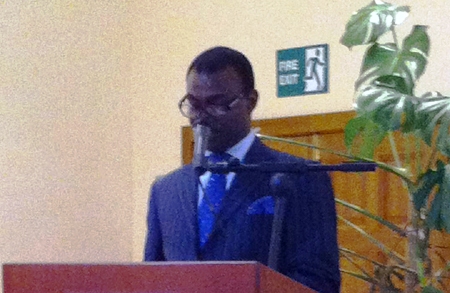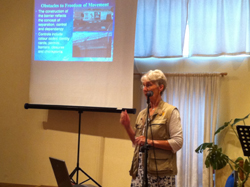![]()
The Words of the Gardiner Family
|
|
The Words of the Gardiner Family |

Mr.
Al-harith Idriss
Freedom of movement is an essential right which is the basis for the exercise of other human rights, concluded the UPF South London conference held to commemorate the 20th annual occasion of the International Day of Peace. About 35 participants attended UPF's event entitled "Building a World of Peace" on Saturday 17th September 2011 at the Peace Embassy building, Thornton Heath. The meeting spotlighted tensions experienced by Palestinians and the Sudanese and featured expert commentaries from speakers with first-hand knowledge of the situations on the ground.
First, Doris Richards spoke about her remarkable experiences with the Ecumenical Accompaniment Program in Palestine and Israel (EAPPI), which provides a protective presence in the occupied territories and monitors human rights abuses. The harsh conditions endured by Palestinians seeking to cross through the separation barrier checkpoints, the inequity of facilities, and the severe restrictions on construction by Palestinians were all highlighted as impediments to normal living conditions in the occupied territories. Doris explained how we could help the situation in Palestine through concerted actions such as boycotting produce from the Israeli settlements. Chigo Ahunanya, a Maltese student at London University, then spoke about youth service projects in Israel co-sponsored by UPF which he has been organizing over the past 4 years. As well as serving local communities through teaching kids and building classrooms, the groups met with Israeli students and brought them to Palestinian areas to open their minds and create a bridge of communication between young people.

In the second segment of the program, the UPF Secretary General, Robin Marsh, gave an insightful presentation on the principles of peace espoused by UPF and how they have been put into practice through peace initiatives such as the Middle East Peace Initiative (MEPI). He illustrated how interfaith efforts were making an impact in the Middle East in bringing reconciliation and a desire to work together for peace. He mentioned UPF's 'Top-down, Bottom up Track II Diplomacy' that was highly appreciated during Nepal's peace process. The final segment of the program focused on the tensions in Sudan particularly in the border regions between south Sudan and its parent neighbor.
In a scholarly and informative presentation, Mr. Al-harith Idriss, a former Sudanese diplomat, explained how contention over grazing rights, forcible relocations and ownership of natural resources have cast a shadow over the birth of the world's newest nation. The speaker suggested an agenda for peace based on interconnectedness between the two nations, with flexibility over borders, interethnic cooperation and pursuit of legal entitlement to human rights including empowerment of women. In the final presentation, Mekki Elsayed demonstrated how a model of cooperation between neighboring countries and religious tolerance could be achieved through the River Nile Civilization Marathon which he had organized in Sudan.
He expressed that applying the UPF principle of recognizing that we are one family under God is the path to peace in Sudan and invited the UPF family to visit his home nation to help bring this message across. All the speakers responded to a variety of thoughtful questions from the audience and the event coordinator brought the meeting to a close by thanking the speakers for their tremendous contributions.